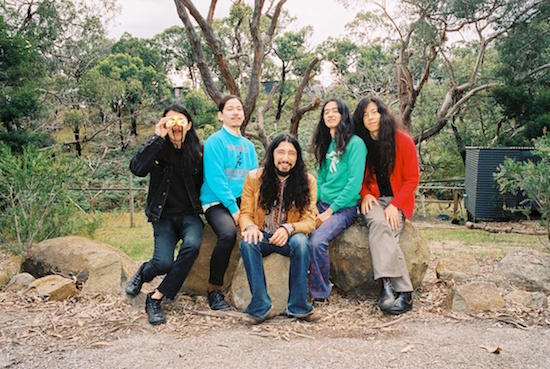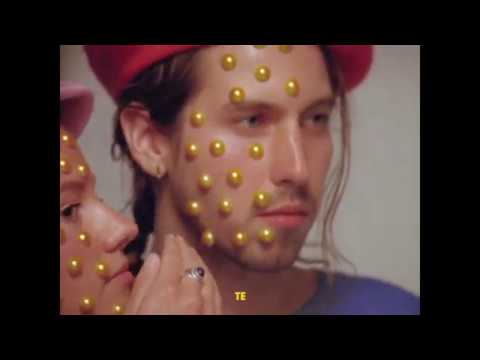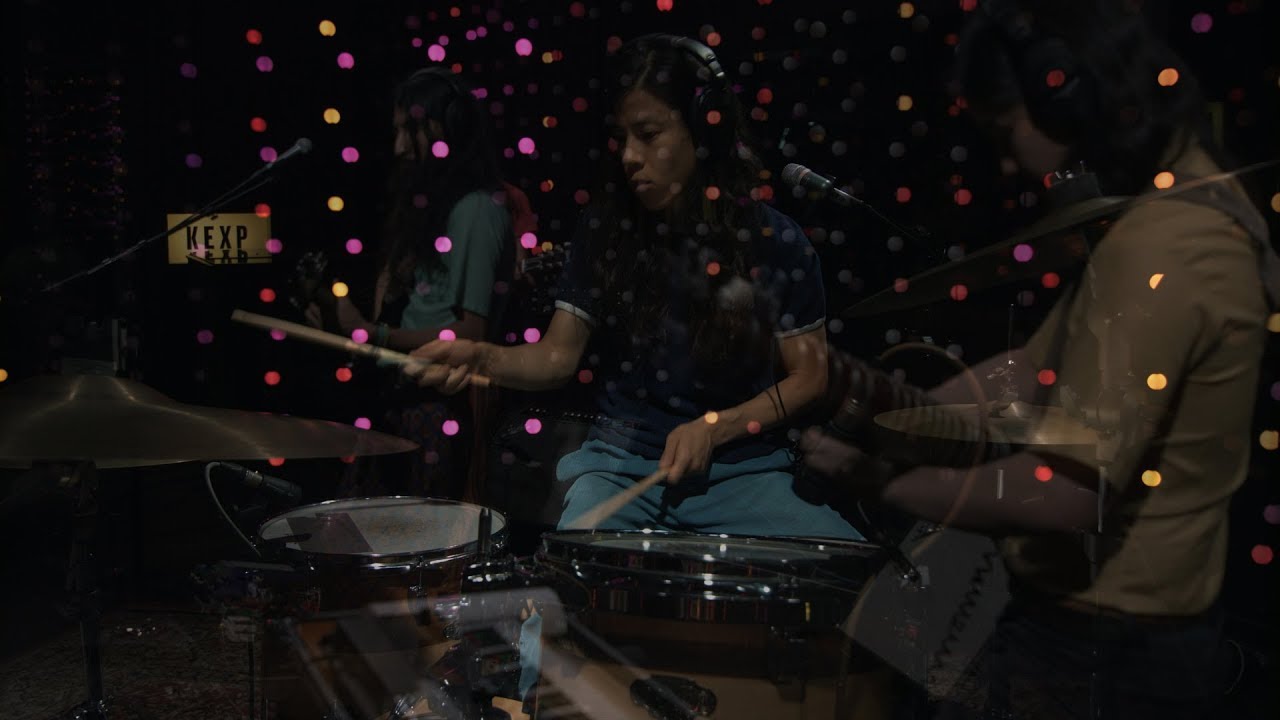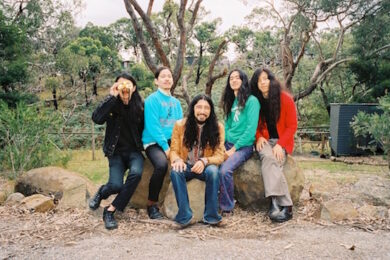Is there a harder working band than Kikagaku Moyo? Over the past two years alone the acclaimed Japanese psych rockers have released two albums and one EP, toured both the US and Europe three times, and racked up dates across China and Australia (not to mention countless festival appearances and collaborations across the globe). “We all write four or five songs a month,” says drummer and vocalist Go Kurosawa of their prolificacy during lunch on a rare day off, “and add them to our Dropbox.” And the Never Ending Tour? He chuckles. “At first, we just wanted to get out of Japan. Now we want to see the globe.”
The quintet have come a long way – both literally and metaphorically – from busking on the streets of Tokyo back in 2012. Their early work flipped between feedback-loaded guitar solos and long sitar drones, and a more progressive, folk approach to psychedelica, a New Weird Japan that borrowed as much from Dylan as it did from the likes of Jefferson Airplane. Such an experimental approach marked them out from their noisier Japanese peers and saw them flourish beyond Tokyo’s cramped clubs and insular music scene.
Kurosawa and guitarist/vocalist Tomo Katsurada escaped permanently in 2016, moving the heart of the band – and their label, Guruguru Brain – to Amsterdam, a switch that was inspired by logistics and a desire to make conquering the West easier for those following in the band’s slipstream. The city is “the centre of the earth for European bands,” says Katsurada, and it’s here we meet, just ten minutes from the house the pair share in the hip, industrial-chic neighbourhood of Oost.
As ever, there is much work to be done. Fresh from a day’s rehearsals with Ryley Walker – their one-off collaboration, Deep Fried Grandeur, is an hour-long improv jam due to be debuted in a few days at Le Guess Who? – there’s the small matter of an upcoming world tour in support of new LP Masana Temples, a rich, mellow record that’s drenched in life and colour, much like the kabuki-inspired artwork that graces its cover. Laid-back funk, jazz, and classical Indian music sit alongside their trademark motorik grooves and acid-tinged folk, with the audible influence of Portuguese jazz guitarist and producer Bruno Pernadas.
The band sought him out not just out of admiration for his work, but a desire to record with someone from a vastly different background; to challenge themselves, essentially, and add new dimensions to their sound. Masana Temples certainly achieves that; it’s their most wide ranging, eclectic record, and one that reflects where the band currently find themselves – far from home, possibility stretching out to the horizon.
Your band restarted the psych rock scene in Japan to a certain extent and revived interest in it. Have there been a lot of bands following in your wake?
Go Kurosawa: Not really. We haven’t seen new bands coming out of Japan with a similar style. Most of the bands on our label play similar music, but they were already around when we started.
Has it got any better for smaller bands there? You’ve talked in the past about ‘pay to play’, and how it’s very difficult to play to live audiences.
GK: It’s changing a little bit. Some venues have stopped ‘pay to play’, but they’re just not charging it to the band anymore – bands still don’t get paid.
Tomo Katsurada: We haven’t been there this past year, actually, so we don’t know. But as far as we can see, or hear, there aren’t really any new things or challenging music coming from Japan from young bands. There are some venues that are well curated and book great bands, so people follow the venue instead of the artists themselves.
A lot of traditional western psych rock music, especially from the 60s and 70s, is intimately connected with drugs, expanding the mind and consciousness. You’ve said that in Japan it wasn’t like that because there wasn’t a particular drugs scene – has that made the music different, in a way?
TK: I think so. Also, in the 60s in America, the older music was a mixture; like western music meets African trance or Asian raga. Those elements make it more psychedelic; they come together and make something interesting, not because it’s “druggy”, you know? With music from Asia, it’s not so related to drug culture.
GK: When psychedelic music came to Japan, it was more about fashion and the colour; the psychedelic part was not as much of a drug experience. So people think of it as a hippy style, with the fashion and the culture. Also, those bands in the 70s who actually sought mind expansion through psychedelic music, I don’t think they sound like us. It was a different time and context.
Does it feel bittersweet that you had to leave your own country to enjoy the level of success that you’ve achieved?
GK: It’s not a sad thing because when we started, we were like most Japanese bands; just playing concerts in the USA and Europe was a big success, as was being able to play and record in general. It’s much more difficult [for Japanese bands] to get English fans and tour Europe – we have the language barrier, we have to fly all the time…
At first, we just wanted to get out from Japan. Now we want to see the globe. We avoided becoming a local band and just because we’re from Japan, we don’t need to only play there. We do places like London and LA several times a year now, and Tokyo only once maybe. We’re more of a global band.
What made you choose Amsterdam as your base for the band and the label?
TK: First of all, because the location is really awesome. There are good connections, a great airport…Amsterdam is the centre of the Earth for the bands in Europe.
GK: It’s easy to get to the States too.
TK: And when we’re touring Europe, it’s easy to pop back home for a bit, like for one day every ten shows or something, on your way from Scandinavia to Spain. Also, running a label in Amsterdam is so much better than what we were doing in Japan because of shipping costs and production companies. It’s easy to meet distributors and other people and talk in person, to make those connections and build relationships.
GK: We also wanted to help Asian bands so that they can tour. We have our own backline that bands can borrow, and they don’t need to pay for a hotel – they can stay at our place and use Amsterdam as a hub. So it made sense for us to move here.
What is the ultimate goal of the label? Is it to give other bands the chances that you never had when you were starting out?
GK: Yeah, but not only from our perspective – for people in the west, in America and Europe. It’s like how people use the term “world music”; it’s such a weird term. We want to make people realise what’s happening [musically] in Africa and other places, we want more diversity, and for people to keep an open mind when it comes to music.
Let’s say you discover a new Thai band, and people become curious about what’s going on in Bangkok; that gives you not only the music but an interest in different cultures, the history of the music scene there compared to what you’re familiar with. I think we can make a little bit of impact and help people be less insular – we can expand interest and opportunities.
As a band, you’re constantly on the move and constantly touring – plus, you two are here, but the other three are still in Japan. Does that sense of displacement work its way into the music?
GK: Since we moved here last year, we were separated for five months. The other months we were together, touring and playing. We wrote some new songs for the new record separately and also together, so that affected that. But we have different challenges that come from being separated. Like, jamming used to be our big thing. We would meet in the studio or somewhere and just play, which obviously we can’t do anymore, but I don’t feel like: “Oh, it’s so different and we cannot be a band anymore.” It’s a good change, and I’m enjoying myself.
Your music seems to be getting mellower with every release. Is that deliberate?
GK: With this particular album, I think it’s because we were writing on tour and when I’m on the road, I don’t want to listen to loud music. We were also listening to a lot of Brazilian music, lots of ambient music too – experimental stuff.
It was also particularly influenced by the time we spent together as a band. We toured so much, we went everywhere and saw so many places. We would have a day off in different countries and those ideas influenced how we made the songs. We made a storybook, from beginning to end, almost like a travelling album.
The band has a very passionate, loyal following. Do you think part of that is because they’re never sure what they’re going to get, or how the set will evolve? So each performance is different or special in some way?
GK: Yeah. I think for the first few years or until recently, most of our fans were record collectors, and an older crowd. Most bands we see, everything that happens on the stage is kind of predictable and expected – they play songs that make people calm and comfortable, no need to focus all the time. But for us, it can totally fall apart and then people can feel the struggle on stage, like: “What’s going on?” It’s about being honest and true.
That adds a more human element to it, like: “These guys are trying something – some of it might work and some of it might not, but let’s see where it goes.”
TK: Sometimes on tour, I meet people who say to me: “You guys are getting better every year!” [laughs] That’s a really good compliment for us because we try to get better every time we play. Improvisation and jamming are really important for us, and this is how we think: “Oh, this sounded good in that show today” If the audience like it and think we’re improving, that’s really nice.
A lot of the music that you draw on for influence concerns spirituality. Is that something that you are interested in or attracted to as well, or is it just about the music and the sound?
GK: It’s not completely separate, like those like mind, power, and peace topics. But it’s not religious for us at all; it’s all about the sound. We don’t choose the audience who listens to our music – they can have their ideas about it. There isn’t much of a message or anything that we want to tell people through songs though. For the most part, it’s up to you and whatever you think – we don’t want to push ideas on people.
You’re big fans of doing things DIY with the records, the merch, the artwork, and everything. Is that the future? Bands taking 100% responsibility and doing everything themselves?
GK: I don’t think that will be the future, to be honest, but bands who are using the DIY approach will increase, so people will have more support from others who are doing it DIY compared to ten years ago. People thought: “Oh, this self-release thing means you don’t have any label, you just write CDrs and so on”, but now people are conscious that bands have their own label, so they say: “I’m going to support them and buy direct”. People are more aware about how the record is created and where it’s coming from, whereas before they didn’t care.
Part of the problem is making your band, or music, a viable business, and having to deal with everything that goes with that – booking, merch, reviewing contracts, syncs, radio play, logistics etc. It can all get in the way of creativity.
GK: Yeah. When people think, or a band thinks, about DIY, they think about releasing the record. Yes, that’s the most important part, but they usually forget about touring, booking shows, merch, and making this aesthetic about how you do it yourself. Do you start your own label, or do you just say: “This is self-released”? There’s a big difference. There’s also how you distribute the album. I see many bands who are self-released and they have a booking agent to help, but they do four shows in the UK in unknown venues; that doesn’t really achieve anything. You need to focus on what you can do by yourself, and what you can let a professional do.
TK: The difference with touring is that you need a lot of promotion. That’s the biggest thing, for any band. And you can release by yourself, you can choose your distribution model, but there’s so much else to consider. What kind of record store do you want to sell in? Who do you want to reach? What kind of scene do you want to be part of? What direction are you heading in? How do you want to go? Maybe those are things you should leave for professionals.
Some bands, when we started, said: “Oh, you guys are so business minded, you’re thinking too much about distribution and PR etc. You should just focus on just playing the music!” But…
Where are those bands now though?
TK: [Laughs] Right? Exactly.
GK: We wanted to make it sustainable and long lasting. We can do a one-year tour of the US and say: “That was a great memory,” and talk about it, tell all our friends. But we always thought about how we can make it last longer and what we want to do long term – so we have to do these things. I guess we’re also lucky in that we enjoy that side of the business too though. It’s how we’ve managed to get where we are today.
Kikagaku Moyo’s new album Masana Temples is out now via Guruguru Brain. The band are currently on tour





